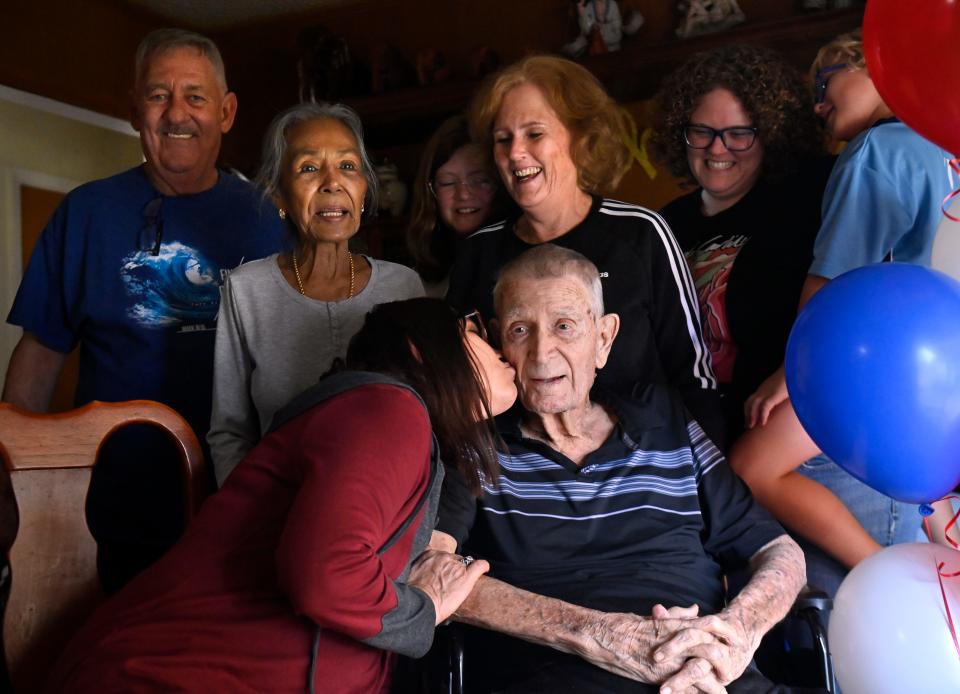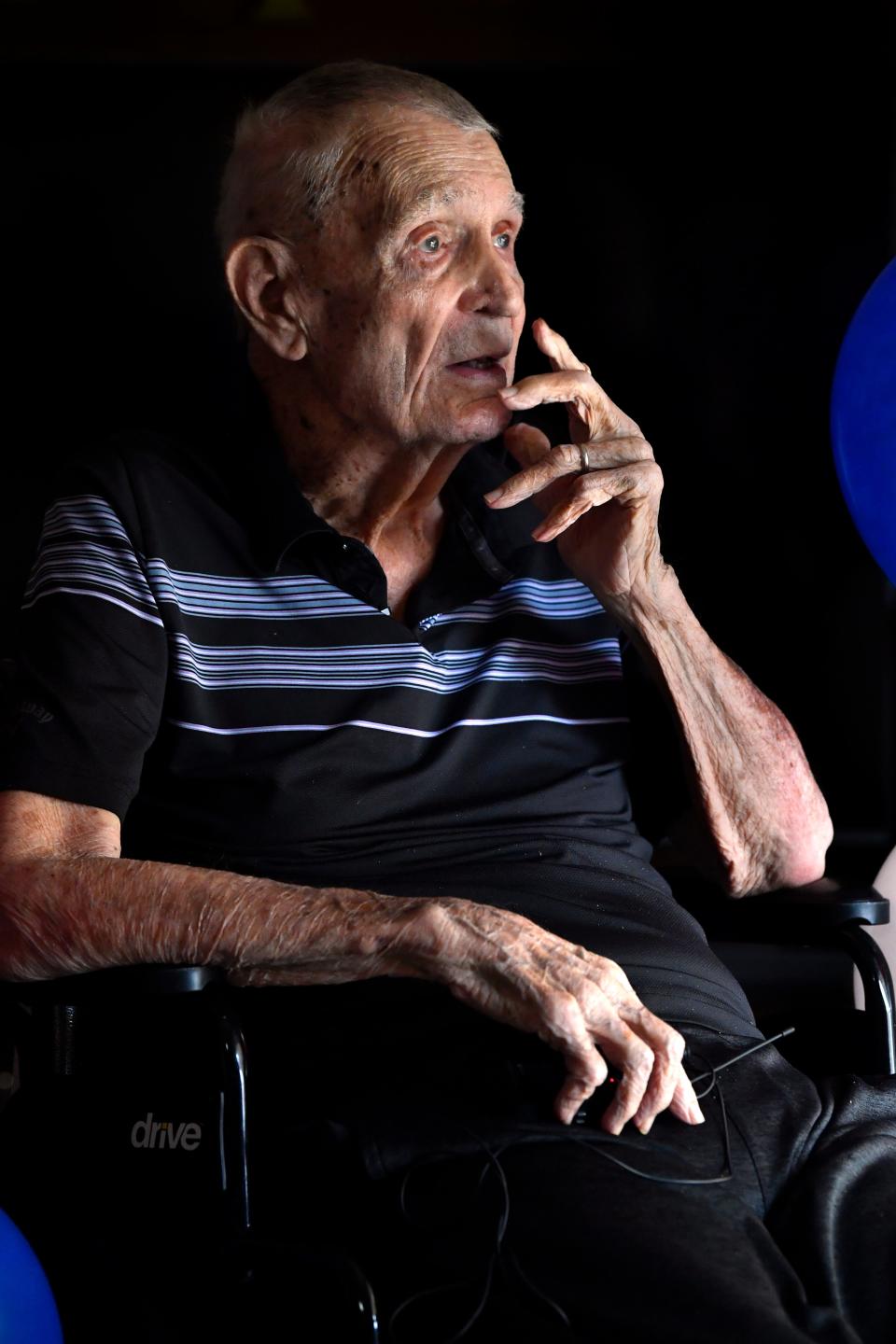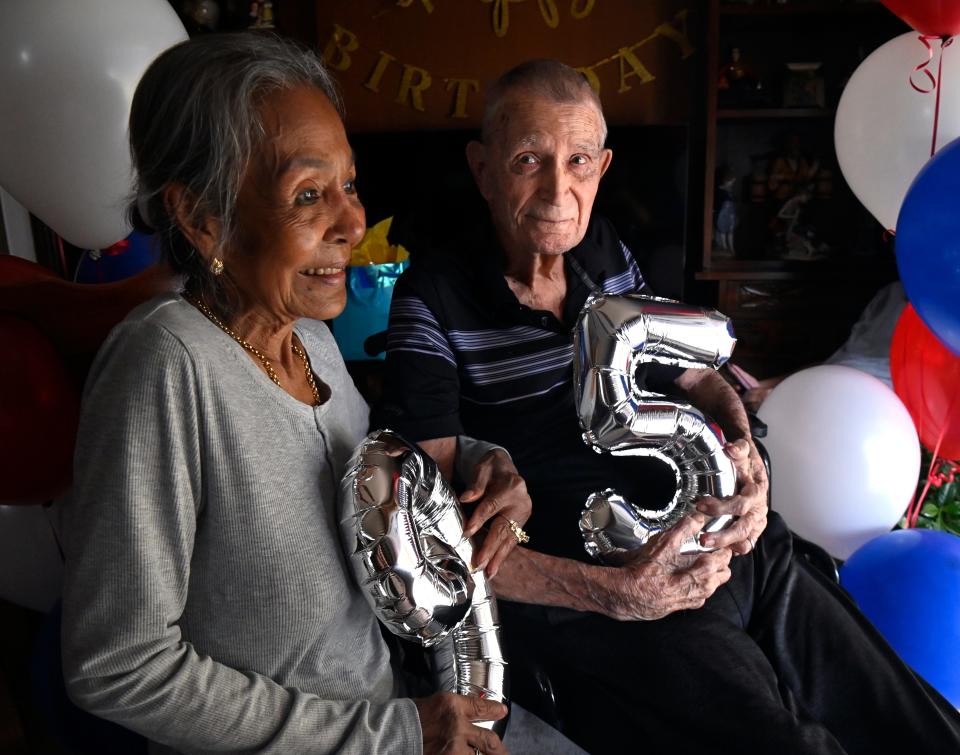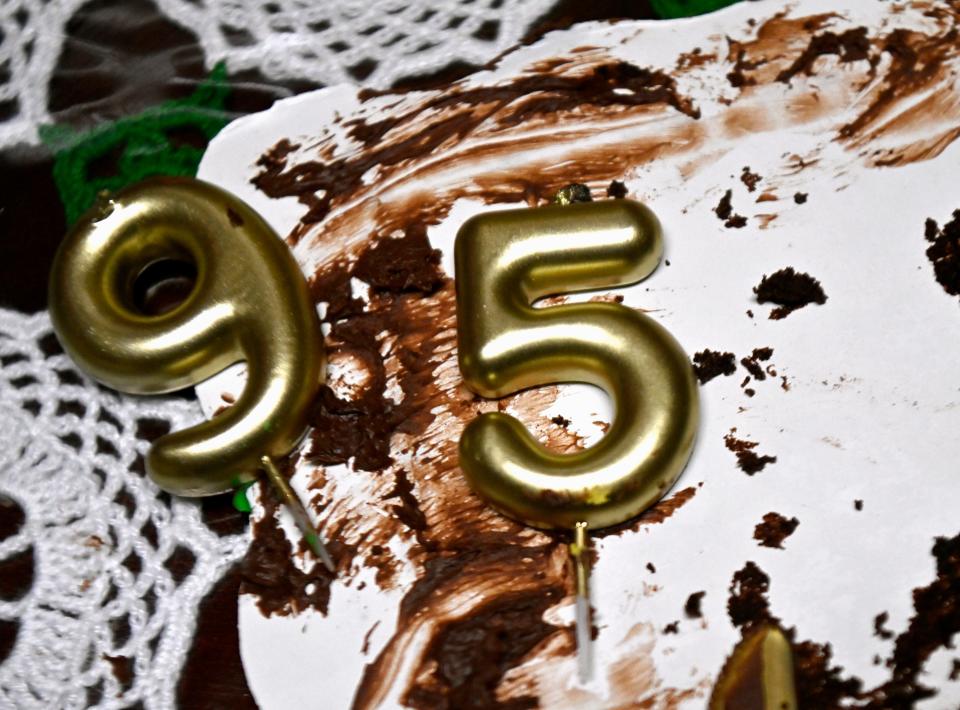Turning 95 on Veterans Day, this vet's most meaningful birthday gift is family
Dwight Painter didn’t give much thought to Nov. 11 other than it was the day he was born in 1928. Back then, it was known as Armistice Day, and that date marked the end of World War I, 10 years before he was born.
But in 1954, U.S. Rep. Edward Rees of Kansas proposed changing the name in the United States to Veterans Day.
That was after a movement sparked by World War II veteran Raymond Weeks who first organized a celebration of veterans featuring parades and ceremonies Nov. 11, 1947, in Birmingham, Alabama.

Of course by that time, Dwight himself was a veteran. He’d joined the Army Sept. 10, 1945, just eight days after the Japanese formally surrendered.
Dwight is one of the few remaining WWII veterans.
Out of 16.1 million Americans who served in the global conflict, the National World War II Museum estimates there are 119,000 still living. U.S. Department of Veterans Affairs statistics cite an average 131 WWII veterans dying each day.
So when Dwight’s family gathered to celebrate his 95th birthday at his Abilene home, it was a moment to not only thank him for his service but also for his enduring presence in their lives.
“I just think it's incredibly magical that he’s 95, he's a veteran, and (his birthday) is on Veterans Day,” said his daughter Trae Booth. “It's just a beautiful, precious thing.”
How does Dwight feel about celebrating his birthday on Veterans Day?
“Kind of a pain in the rear,” he said with a wry look, eliciting laughter from the dozen or so family members in the room.
While being born on a holiday might for some steal the thunder from what should be their day, Dwight did clarify that no matter what, it was wonderful to see his family again.
“It means everything. I haven't seen some of them in a long time,” he said.
Boot camp memories
“I was born in Nocona, but we moved out to Forsan in 1930 when I was 2,” Dwight said.
At 17 years old, he needed his parents’ permission to join the Army.
“Dad signed for me because I had two months to go before I would be eligible. But everybody wanted to go, saying, 'Hey, we got three years schooling,'” he recalled.
He wouldn’t be the last recruit tempted into service by college tuition.
“We went to Aberdeen, Maryland,” Dwight said. “Boy, it’s cold up there. They didn’t have any heat, and the barracks were restricted.”

Like millions of boot camp trainees over the years, one of Dwight’s more vivid memories from basic came from tear gas training.
“The main thing I remember was when they put me in there with a mask on,” he said.
When the command came to remove it from his face, Dwight dutifully followed those orders.
“They told me to give my name, serial number, address, so forth,” he said. “Boy, I got about halfway through, and I choked. They shoved me out the back door and saved me.”
On the town
Once they’d proven themselves, after some time the recruits were told they were eligible for weekend passes. Dwight jumped at the opportunity and having never been to the East Coast, took a trip to New York and Pennsylvania.
“I got to see Philadelphia and the Liberty Bell,” he recalled, staying overnight in lodging reserved for servicemen and returning that Sunday afternoon.
“I went to check-in, and the sergeant said, ‘Where’ve you been?’ I said, ‘Well, you said we had leave for the weekend,'” Dwight said, then laughed at the memory. “He said, ‘You're supposed to sign out to let us know where you're going.’”
Oops.
An ancient mountain and thoughts of home
By his 18th birthday, Dwight was ironically back in Texas, laying-over for a couple days in Big Spring on a train bound westward to his first post. The chance to see family and familiar surroundings was unexpected but welcome.
“I don’t know why. I was very fortunate,” he said of the delay.
In California, he joined 3,000 other soldiers as they all boarded a ship headed for Japan.
“They wanted to get everybody over there so they could get the ones that had enough points home,” he said. “So we went to Korea and docked. Everybody but 300 had to stay onboard, and I was one of those 300 that went on to Yokohama, Japan.”
A year after the surrender, the effects of the war were still quite apparent.
“The main thing I recall was when we went from Yokohama to Tokyo, there was only one smokestack standing in between the two cities. They’d bombed them flat,” he said. “Yeah, it was unreal.”
Thanks to friends he’d made while in the Army, culture shock never got to him. And while he didn’t smoke, he still had an interest in cigarettes. They made an effective currency for bartering with the local Japanese.

While he was only there a year, Dwight said he traveled, “Everywhere I could.” The view of Mount Fuji was one of his favorite memories.
“Every morning when you came out, you could see the mountain in the distance. You know, it was about 60 miles away,” he said.
And his thoughts while looking upon it?
With a guilty-sounding laugh, he quipped, “Going home.”
Along came a family
After his enlistment, the Army made good on their promise, and Dwight soon found himself at the University of North Texas.
His major?
“Women,” he deadpanned. “That's about it, sorry to say. I considered graduating.”
He had thoughts of becoming a Texas Department of Public Safety patrolman but said at the time they weren’t hiring. So he joined the licensing division for the next year and a half, working in San Antonio for part of that time.
One day, a woman pulled up to the side of their building, speaking briefly with the DPS sergeant on duty who directed her to park.
Minutes later, Dwight came along and saw her parked where he thought she shouldn’t be.
“Lady, you can’t park there,” he said.
She gave him a look.
“You wanna bet?”
That was Tessie, and after they became friends, they took a chance and became husband and wife. But try as they might, having their own children eluded them. So instead, they decided to adopt.
“We needed a kiddo,” Dwight explained. “You got enough love and care that you can take care of one or two children.”
Trae and her brother David were both adopted by Dwight and Tessie.
“We got David when he was seven hours old,” Dwight said. “We lived in Waco. We got him for $150 for natal service, the basket and everything.
“That was it, $150, and we headed back to Waco.”
The costs for Trae’s adoption were a little higher at $2,000.
“They say when you're more expensive, you know, it's for a reason. You pay for quality,” she joked as the rest of the family joined in her laughter.

Building a new life
The family lost Tessie in 1997 though it wasn’t long until someone new came into his life, a Thai woman named Somthawil.
It’s common in Thai cultures for people to carry the nicknames they were given as children into their adult years, and hers is "Daw." Interestingly, the name rhymes with “Pow," and by coincidence, that’s a pretty accurate description of her impact in his life.
“We almost lost Dad twice this year,” Trae said, adding first, it was from an infection and later, after Dwight fell and broke a leg.
“He had kind of gotten weaker and weaker, and we didn't think he would pull out of it. We really didn't,” she said.
Rehabilitation and physical therapy were the prescription for Dwight’s recovery, but it was Daw who made it all happen.
“I'm telling you, the love of Mama here, she completely whipped him into shape making him do his exercises,” Trae said. “He looks like Dad again. I mean, it's really a miracle.”
Daw for her part, humbly accepts the praise.
“He’s a great man,” she said. “I take good care of him. I cheer him up so we can have a life together again, you know?”
Memories and more
So, what does 95 feel like?
“I couldn't tell much difference from 80 or 85. Except, you know, for the broken bone in my leg,” Dwight quipped.
Age had forced him to give up his lifelong love of playing golf. So instead his sports passions these days have turned toward the Kansas City Chiefs and quarterback Patrick Mahomes.
“Ma-homie!” he joked. “We like Mahomes and the Chiefs. Every Sunday I'm running around here yelling, 'Ma-homie, Ma-homie!'”
He keeps his mind sharp with a love of reading. He’s a big fan of author Michael Connelly’s crime novels, whose characters Detective Harry Bosch and the Lincoln Lawyer Mickey Haller all have their own TV shows.
But sometimes, Dwight’s thoughts turn to those moments long ago when he was just a West Texas kid staring at a distant, ancient Japanese mountain, his thoughts on his home.
Does he remember any of those characters from his Army days? Perhaps a few, but while the names may have faded, the faces are still vivid in his memory.

Who does he remember? Maybe his drill sergeant?
Dwight pauses, mulling the question over.
“I still got her!” he said, hooking a thumb at Daw as his gathered family burst with laughter once more. “She's one in a million, I'll tell you. She's the best you could ever have.”
This article originally appeared on Abilene Reporter-News: Family visits are WWII vet's most prized gift on his birthday

